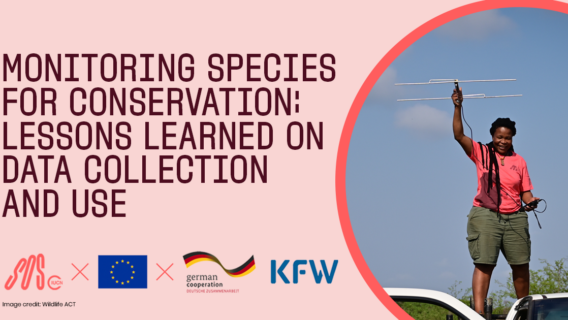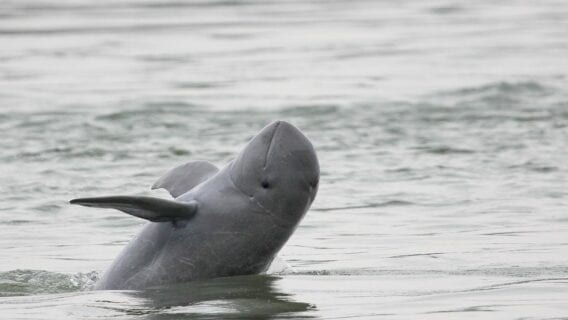Advancing species conservation at CBD COP16: event highlights from the IUCN Species Convention Action team

These events centred on practical solutions to address biodiversity loss and implement the Kunming-Montreal Global Biodiversity Framework (GBF), focusing on species conservation as a core element of broader biodiversity efforts.
Halting the species extinction crisis: opportunities and challenges for sustainable wildlife management
This side event on October 22, 2024, focused on the urgent need to address the growing species extinction crisis, primarily driven by human activities. The discussions were guided by Target 4 of the Kunming-Montreal Global Biodiversity Framework (GBF), emphasising the importance of species recovery through targeted species management interventions. The session explored how National Biodiversity Strategies and Action Plans (NBSAPs) could drive species conservation and recovery efforts, with a focus on collaborative approaches that involve governments, private sectors, donors, and civil society.
The key objectives of the event were to showcase the impact of the IUCN Save Our Species SOS African Wildlife initiative in driving species recovery, discuss the roles of National Biodiversity Strategies and Action Plans in species recovery, highlight the opportunities and benefits of private sector involvement in conservation, and explore the role of the European Union in supporting biodiversity conservation efforts in Africa through the GBF. These objectives underscore the need for multi-stakeholder engagement to ensure the conservation and sustainable management of wildlife.
Key speakers included Stewart Maginnis (Deputy Director General – Programmes, IUCN) who provided the opening remarks, followed by Dao Nguyen (Senior Programme Manager, IUCN) who discussed the impact of the IUCN Save Our Species African Wildlife initiative. Thierry Dudermel (Team Leader for Biodiversity at European Commission Union Directorate of International Partnerships) spoke about the EU’s role in supporting biodiversity conservation in Africa. Innocent Maloba (Global Policy and Advocacy Coordinator, WWF International) presented the Living Planet Report , while Veronika Blach (Senior Programme Lead, Environmental Specialist, TUI Care Foundation) focused on the importance of private sector engagement in conservation efforts.
In his opening remarks Stewart Maginnis underscored the urgency of addressing the species extinction crisis, noting that 28% of species face extinction. He highlighted Africa’s rich biodiversity, essential for ecosystem health and economic stability, yet threatened by habitat loss and climate change. Through the Kunming-Montreal Global Biodiversity Framework and NBSAPs, he called for collaborative, localised conservation efforts. He also showcased the SOS African Wildlife initiative, which delivers species conservation action on the ground, policy development, and community involvement to halt biodiversity loss.
In his speech, Thierry Dudermel underscored the importance of partnerships among conservation organisations, donors, and the private sector for effective species conservation and environmental goals. Highlighting the collaboration with IUCN through initiatives like IUCN Save Our Species, Dudermel recognised the generation of valuable knowledge from frontline actors and the strengthening of local civil society capacities. The EU’s commitment to biodiversity conservation in Africa, particularly through the Kunming-Montreal Global Biodiversity Framework, was outlined, along with integrated initiatives like NaturAfrica that combine conservation with livelihood improvements. However, significant funding challenges were acknowledged, necessitating coordinated strategies involving financial institutions. Dudermel stressed the need for collaboration to ensure impactful support for biodiversity and expressed eagerness for further discussions on the EU’s conservation efforts.
Presentations from the SOS African Wildlife initiative, WWF and the TUI Care Foundation addressed critical wildlife conservation challenges and opportunities.
SOS African Wildlife outlined hurdles such as financial constraints, weak legal frameworks, political instability, and climate change impacts, stressing the need for improved international collaboration and alignment with NBSAPs. WWF presented the Living Planet Report that revealed a 73% decline in global wildlife populations over the past 50 years, with Africa facing a 76% decline, underscoring the urgent need for action. However, there are conservation successes, including stable populations of African Forest Elephants and an increase in Mountain Gorillas. Lastly, the TUI Care Foundation highlighted the role of community-based tourism in financing conservation, pledging 10 million Euros by 2030 to promote sustainable tourism in Least Developed Countries, while protecting 350 hectares of land and creating local jobs.
Leveraging the Global Species Action Plan and its online knowledge platform for effective implementation of the Kunming-Montreal Global Biodiversity Framework
Our second side event on October 23, 2024, showcased how the Global Species Action Plan (GSAP) and its innovative Online Knowledge Platform can support CBD Parties and stakeholders in implementing the Kunming-Montreal Global Biodiversity Framework (GBF). The GSAP was developed to guide strategic conservation actions necessary to protect species and promote their sustainable use, while the Online Knowledge Platform provides tools, training, and technical support to help stakeholders identify the best guidance and practices for species conservation and management.
The session explored the practical application of the GSAP as a valuable resource for CBD Parties and stakeholders, demonstrating how its recommended actions can help achieve species conservation outcomes for the GBF framework. The event also presented the features and benefits of the GSAP Online Knowledge Platform, highlighting how it supports the implementation of the GBF. Additionally, the event featured case studies from the Republic of Korea, Türkiye, and Brazil, illustrating successful national-level species conservation actions. Discussions also focused on how the GSAP can accelerate on-the-ground conservation efforts by mobilizing knowledge through its online platform.
Key speakers included Bok Chul Chung (Director General of the National Institute of Biological Resources, Ministry of Environment, Republic of Korea), who delivered the opening remarks, and Dao Nguyen (Senior Programme Manager, IUCN), who introduced the GSAP and Online Knowledge Platform. Dr. Fehmi Arikan (Head of Department of Biodiversity, National Focal Point of the Convention on Biological Diversity, General Directorate of National Parks and Nature Conservation, Türkiye) shared insights into Türkiye’s National Species Conservation Strategy, while Marília Marini (General Coordinator of Conservation Strategies, Chico Mendes Institute of Biodiversity Conservation, Brazil) presented on Brazil’s National Action Plans and their newest species conservation tool, the Impact Reduction Plans (PRIMs). Additional presentations were made by Aída Vasco Palacios (Vice President of the Colombian Mycology Association ASCOLMIC, Member of the Fungal Conservation Committee) on fungi conservation, Dr. Carly Cowell (Acting Secretary General and Director of Conservation) on plant conservation strategies, and Mike Clifford (Strategy Director, Reverse the Red) on how GSAP can support GBF Target 4 at the national level.
The event concluded with discussions on how to scale up species conservation action at the national level to achieve the GBF goals and targets. GSAP and its Online Knowledge Platform can support governments and all stakeholders to identify the actions to scale up. Exchange of knowledge, technical tools and best practices as well as collaboration and partnerships will help foster those actions.
Looking forward
These events at CBD COP 16 highlighted the critical need for cross-sector collaboration and strategic action to halt the global species extinction crisis. By leveraging frameworks like GSAP and its Online Knowledge Platform, countries can align their NBSAPs with the ambitious goals of the GBF, ensuring that conservation efforts are sustainable, scalable, and impactful.
The collective efforts of governments, international organizations, the private sector, and civil society underscore the importance of coordinated global action in conserving biodiversity. As discussions continue at CBD COP 16, these initiatives provide a roadmap for achieving the shared goal of halting species extinction and fostering a future where biodiversity thrives.




